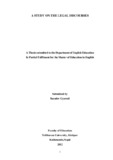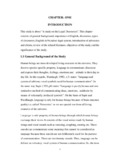Please use this identifier to cite or link to this item:
https://elibrary.tucl.edu.np/handle/123456789/726| Title: | A Study on The Legal Discourses |
| Authors: | Gyawali, Basudev |
| Keywords: | legal discourses;Advocates;judicial professionals |
| Issue Date: | 2012 |
| Publisher: | Central department of English Education |
| Institute Name: | Central Department of English |
| Level: | Masters |
| Abstract: | The present study entitled “A Study on the Legal Discourses” attempts to find out the legal discourses between Advocates and their clients to the related field of the advocacy. This study sought to discover whether legal discourse is important for judicial professionals and if needed in which special purpose it was required for them. Similarly, it found out how much of legal professionals used legal discourse with their clients in their regular practice of judiciary practice. It also aimed to identify the benefits of using legal terms while appealing in the court for their professional development of the advocates. The research study was mainly based on the primary sources of data, collected from the different professional judges and advocates such as Chief Judge to several defence lawyers, criminal lawyers, private lawyers, governmental lawyers and the members of law and Justice Council. The concerned offices were selected by using purposive sampling procedure. This study showed almost all of the judiciary professionals had positive attitude towards legal discourses. The data was collected with the help of interview and fourteen open-ended forms of questions. This study found that there was gap between judiciary professionals’ knowledge and practice. They considered legal discourses were very effective means of their professional development but its practice in their field was deplorable. This thesis consists of four chapters; the first chapter includes the general background of the study, Importance of English, Some specific types of discourse, English in Nepalese legal system, brief introduction of advocates and clients, review of related literature, objectives of the study and significance of the study. The second chapter includes the methodology adopted during the study i.e. tools 11 for data collection, sources of data collections, process of data collections and data, limitations of the study and data analysis procedures. The third chapter which is main part of the study deals with interpretation and analysis of systematically collected data descriptively and analytically. The last chapter comprises major findings, recommendations and some pedagogical implications of the study, which have been derived on the basis of analysis and interpretation of data. At the final part of the thesis, references and appendices are included. |
| URI: | http://elibrary.tucl.edu.np/handle/123456789/726 |
| Appears in Collections: | English Language Education |
Files in This Item:
| File | Description | Size | Format | |
|---|---|---|---|---|
| cover.pdf | 40.8 kB | Adobe PDF |  View/Open | |
| CHAPTER.pdf | 153.59 kB | Adobe PDF |  View/Open |
Items in DSpace are protected by copyright, with all rights reserved, unless otherwise indicated.
